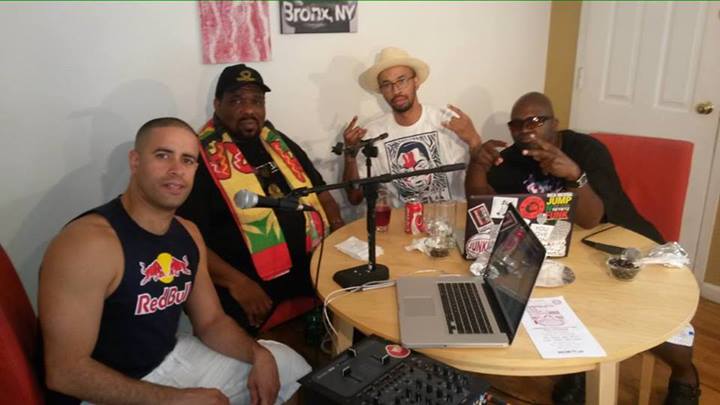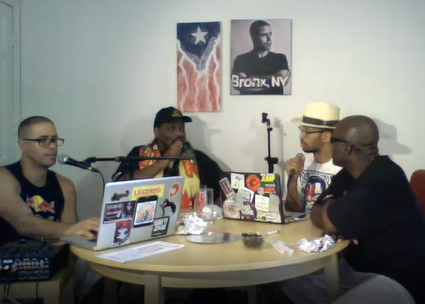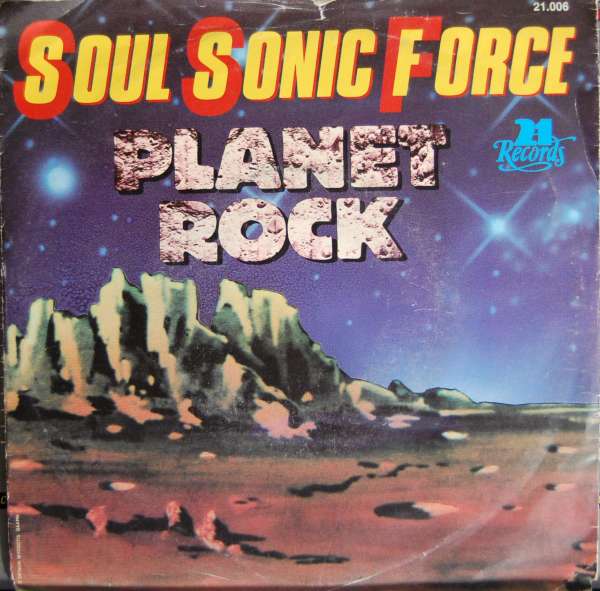This section taps into the origins and influences that shape Hip-Hop culture.

In the wake of Kool Herc's 40th Anniversary of Hip-Hop Culture show held at Summerstage in Central Park, New York City on August 10th, the discussion about the origins and history of Hip-Hop culture was sparked once again.
Crazy Legs, famous b-boy member of Rock Steady Crew, decided to invite his mentor Afrika Bambaataa, Grand Wizard Theodore and Rich Medina for a discussion on the topic of the beginnings of Hip-Hop in the South Bronx in the early 1970s.
Part of the reason there is debate about this topic is the nature of the traditions. Rich Medina explains, "A great deal of hip-hop has been passed through by verbal tradition by different crews to different people."
"We are going up against some legendary tales that some of us are responsible for putting out," admits Crazy Legs.
To understand hip-hop, you first have to understand the environment where it began. An important fact to consider is the geography of the Bronx. Movement between neighborhoods was not easy. There were strong territorial obstacles. It was treacherous. People within the Bronx mainly stayed in their neighborhoods.
"I was either very brave or very stupid 'cause I went into ball buster territory back in the days. On their block on 137th street, snuck in a quick battle against these kids Chino and Brian and jetted the hell out of there!" says Legs.
Mass transit to and from other boroughs was limited in the 1970s and early 1980s compared to now. This meant people from other boroughs were not as likely to travel there.
There were many moving pieces, primarily rooted in the Bronx, that coalesced to build Hip-Hop culture. The economic times, presence of street gangs, drugs, burning of buildings. The changing demographics also was a significant factor. Jamaican, Dominican, various other West Indians and Puerto Rican cultures dominated the cultural and musical scene.
There were people involved in graffiti. There were DJs. Emcees would get on the mic during a party or park jam. There were b-boys, breakers, dancers moving to the music. All of this was going on. Who recognized all this as an entity? A new culture developing?
"I see Afrika Bambaataa as the person who nurtured hip-hop. He saw a piece of wood and carved it [hip-hop] into a boat. I first met Bam in 1981. He defined the elements of hip-hop to us (Rock Steady Crew). Made us aware of knowledge of self. Breaking, writing, emcees, DJs," says Crazy Legs.
Afrika Bambaataa recognized that the music, dancing and art could be used as tools to address social injustice. Bambaataa was creating a culture. Peace, unity and fun. Acknowledging ancestral history, embracing the b-boys/dancers/breakers and graffiti writers.

"I never saw anyone before Bam say 'this is hip-hop'," explains Legs.
Bambaataa explains that Lovebug Starski & Keith Cowboy used word hip-hop in their rhymes. The Zulu Nation decided to use this term officially. Bambaataa's musical influences include James Brown (Soul), Sly & The Family Stone (black rock also known as Funk), George "Parliament Funkadelic" Clinton (Funk) and Uroy with the tradition of Jamaican toasting (Reggae).
The Zulu Nation has been stopping violence for more than 40 years. Hip-Hop is 39 years old (1974-2013). Bambaataa took a trip to Africa after seeing film Zulu. "I won a contest through UNICEF. I wrote an essay. I went to Africa for 2 weeks. I went to Europe for 1 week. Bambaataa was one of the last chiefs fighting European invaders for South Africa. Seeing that Africa had big cities and people working hard everyday blew my mind." He saw first hand that the images in media were bullshit.
"I started with one turntable in Bronx River Center at a very very early age," says Bambaataa. Bam cites various radio show DJs: WLIB 1190 AM (Eddie O'Jay), WWRL 1600 AM (Gary Byrd/Jocko); WABC 770 AM (Cousin Brucie); Sly Stone as DJ (shock style rapping San Francisco, CA KSOL via tapes). Frankie Crocker (WLIB/WBLS 107.5 FM) show in early 80s. Bam also credits Cool DJ Dee (Black Spades), Tyrone the Mixologist, Disco King Mario and DJ Hollywood.
Bam filled in for Frankie Crocker often. He was the first DJ to play Prince "When Doves Cry". The Zulu Nation was on the Southeast side. Herc was on West side. It was common for bands to play shows in the neighborhoods. Eventually the DJs replaced these bands. The DJs took over in the streets.
Famous dates in Hip-Hop history include August 11, 1973 and November 12, 1974. Kool Herc's event at 1520 Sedgwick Avenue for his sister's birthday party is August 11, 1973. Afrika Bambaataa and The Zulu Nation mark November 12, 1974 as the beginning of Hip-Hop as a specifically defined culture.
"Kool Herc was bringing the records from the islands," explains Theodore.
"Herc brought the bigger sound. He brought in emcees. He had the best sound equipment (speakers)," says Rich Medina.
Grand Wizard Theodore talks about his early memories. "I got introduced to Hip-Hop by my brother Mean Gene and Grandmaster Flash. I first saw Kool Herc and the Twins. I'm from Boston Road area/169th & Washington Ave. (Bronx). I was 11-12 yrs old. Herc played James Brown, Sly & The Family Stone to remind people of the music. Bam would play music from all over the world and emphasize the message in the music. I learned more about myself, my ancestors. He gave a broader perspective of music for his people."
"Lovebug Starski, DJ Flowers were DJing before me," adds Theodore.
The focus of the origins of Hip-Hop always points to The Bronx, but other pockets of people in New York city could have been participating in the culture. You cannot rule that out.
"If I'm DJing in the Bronx in 1975 and you DJing in Queens in 1975, I have to give props where props are due," admits Theodore.
"I created the scratch in 1975. Flash extended breaks. He created the backspin. I created the needle drop," explains Theodore.
Rich Medina explains DJ techniques created by Grand Wizard Theodore & Grandmaster Flash. "Clock Theory" is the backspin. "Extending the break" is cutting. "Scratching" is the back and forth movement of the record. "Needle Dropping" is picking up the needle and dropping it back at the beginning of the beat.
"Chuck Chuck City crew and Disco King Mario. I didn't realize they were doing stuff in different parts of town (NYC) until I started DJing with them," says Theodore.
Afrika Bambaataa & The Soul Sonic Force released "Planet Rock" on April 17, 1982. It was an underground hit at the time, but it changed Hip-Hop. Electro is an up-tempo dance style music defined by synthesizers. This was a new musical technology at the time.

"When I first heard Planet Rock, I was like 'something was about to happen'," says Theodore.
During this four-hour discussion on the history of Hip-Hop, Crazy Legs, Afrika Bambattaa, Grand Wizard Theodore and Rich Medina covered many topics, but only scratched the surface. Some of this information has been published in many articles in the last 35 years. However, some of the details were gems. Hearing about the culture firsthand from the people directly involved in it is priceless as a hip-hop historian.
"What we're arguing is the definition and presentation of the notion hip-hop to the public as something that is a thing. Fundamentally, that is the debate. We're talking timeline based documentation," states Medina.
Afrika Bambaataa made it very clear during this discussion that he does not have any ill will toward other pioneers personally.
"Kool Herc is my brother. Do not try to cause no friction. We have no problems at all," emphasizes Bambaataa.
There are disagreements that linger about the specific historical points. Legs wondered if there can ever be a consensus among the godfathers.
"Popular versions of the truths vs. facts. That's why we have science," explains Afrika Bambaataa.
"Hip-Hop culture started in Bronx River," says Bambaataa. He believes that extensive documentation, through interviews, flyers, photographs have to be collected and put out to the public. "We have to take the egos out when we have this discussion."
"It's time for us to be our own hip-hop scholars," says Crazy Legs.
-Dogmatic
The full discussion can be seen here:
The Lunch Breaks Hip-Hop History Discussion Part 1
The Lunch Breaks Hip-Hop History Discussion Part 2
Crazy Legs Workshop: The Lunch Breaks Show
Bonus Section
Dogmatic: Given that hip-hop has always been a competition, that must ring true with who did what first and where.
Rich: Good point.
Legs: Yes. I think the nature of hip-hop and my perspective and how I got into it, in its very essence, you're always sharpening up your skills so that the next time you go out, you are raising eyebrows. If you are that DJ that is the headliner, it's for a reason. The nature of competition when it comes to history is pretty bad though 'cause that just causes confusion.




